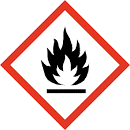Flammable chemicals
Flammable chemicals are classified and labeled:
- H224 Extremely flammable liquid and vapour.
- H225 Highly flammable liquid and vapour.
- H226 Flammable liquid and vapour or
- H228 Flammable solid.
A flammable liquid shall be classified in one of the three categories according to flashpoint and boiling point, e.g. ethanol, acetone and metanol.
Table 1: Flammable liquids:
H224 Flam. Liq. 1 | Fp < 23° Bp ≤ 35°C |
H225 Flam. Liq. 2 | Fp < 23° Bp > 35°C |
H226 Flam. Liq. 3 | 23° ≤ fp ≤60 °C |
No labelling | 60° ≤ fp ≤93 °C |
A flammable solid means a solid which is readily combustible, or may cause or contribute to fire through friction.
Readily combustible solids are powdered, granular, or pasty substances or mixtures which are dangerous if they can be easily ignited by brief contact with an ignition source, such as a burning match, and if the flame spreads rapidly.
Table 2: Flammable solid:
H228 Flam. Solid 1 Danger | Burning rate test Substances and mixtures other than metal powders: a) wetted zone does not stop fire and Metal powders: |
H228 Flam. Solid 2 Warning | Burning rate test Substances and mixtures other than metal powders: a)wetted zone stops the fire for at least 4 minutes and Metal powders: |
For further details regarding classification and labeling visit the Regulation on classfication, labelling and packaging substances and mixtures, chapter 2.
